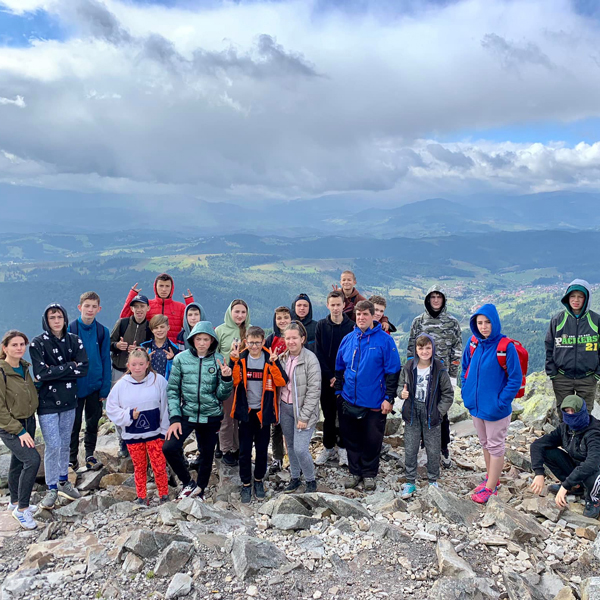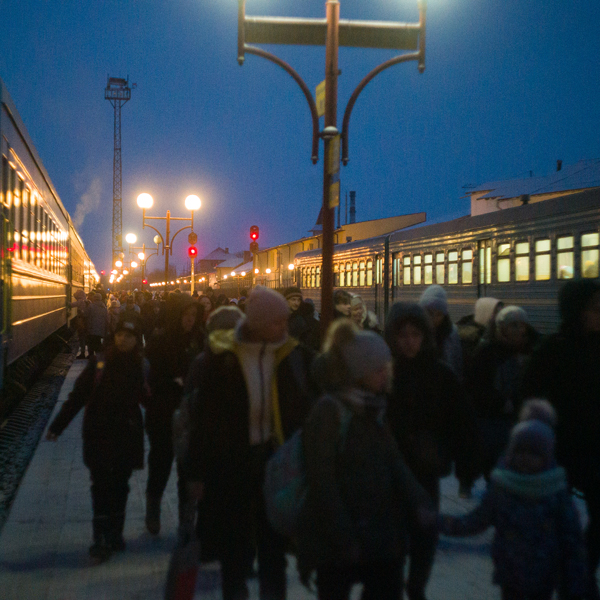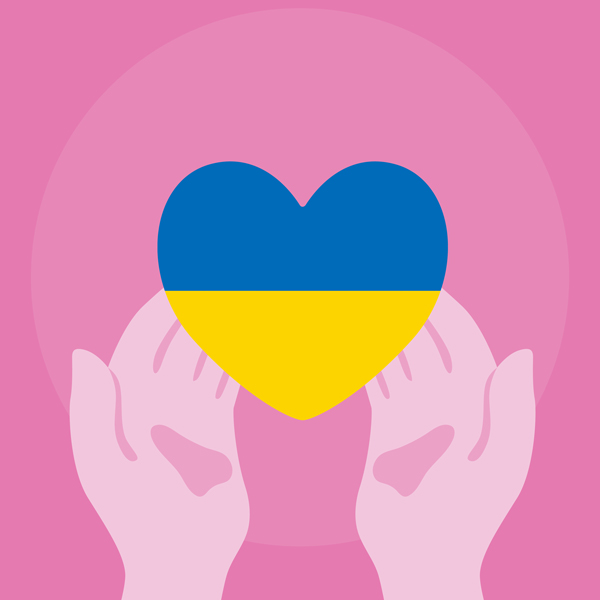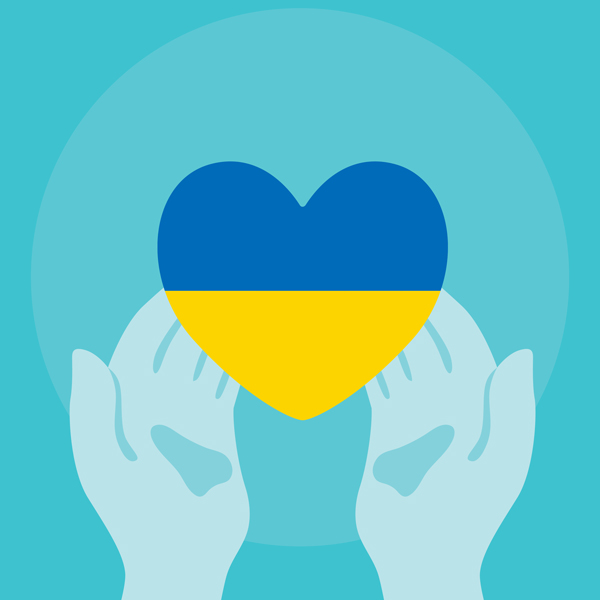Content warning: this story contains descriptions of trauma experienced during the war in Ukraine.
GFC’s partners in Ukraine are helping children with disabilities and their families evacuate to safer areas and get essential supplies. In this blog post, GFC’s Liza Yanovich shares messages from one partner organization and the families it supports that show how the war is impacting children and how this local organization is providing vital support.
March 30, Sievierodonetsk: “My dear, [cell] service has been cut off, I am at the school, in the basement. There are 7 of us – children, women, and I am in a wheelchair. We have no electricity, service, food, water, blankets, or beds. It’s really cold, and the bombing is intense. Please get us out of here. I hope my message reaches you. Please, may they find us. 🙏”
Text messages like this one to GFC partners in Ukraine are often the beginning of a long chain of logistics to help people in dire need. After receiving such a call for help, one GFC partner activates her wide network to contact people – both regular citizens and officials high up on the chain of command – in the city or region from which the request originates, in an effort to organize an evacuation, deliver supplies, or simply to reassure those reaching out. By ringing all the alarm bells she can find to get Ukrainian children and their families to safety, our partner is working at the very grassroots of humanitarian aid.
In response to the text message above, with GFC’s support, the partner was able to evacuate the three adults and four children and get them out of the country. (For their safety, GFC is not naming its partner organizations in Ukraine unless they have asked to be publicly identified.)
Since the first days of the war, GFC has been in constant contact with its partners in Ukraine. As discussed in previous blog posts, several GFC partners in Ukraine work with children and young people with disabilities. During the last two months, I have been regularly speaking with the director of one of these organizations. The director, her family, and some of her staff escaped to Latvia in the early days of the war, but she continues supporting hundreds of families in Ukraine as well as those who have fled to other European countries.
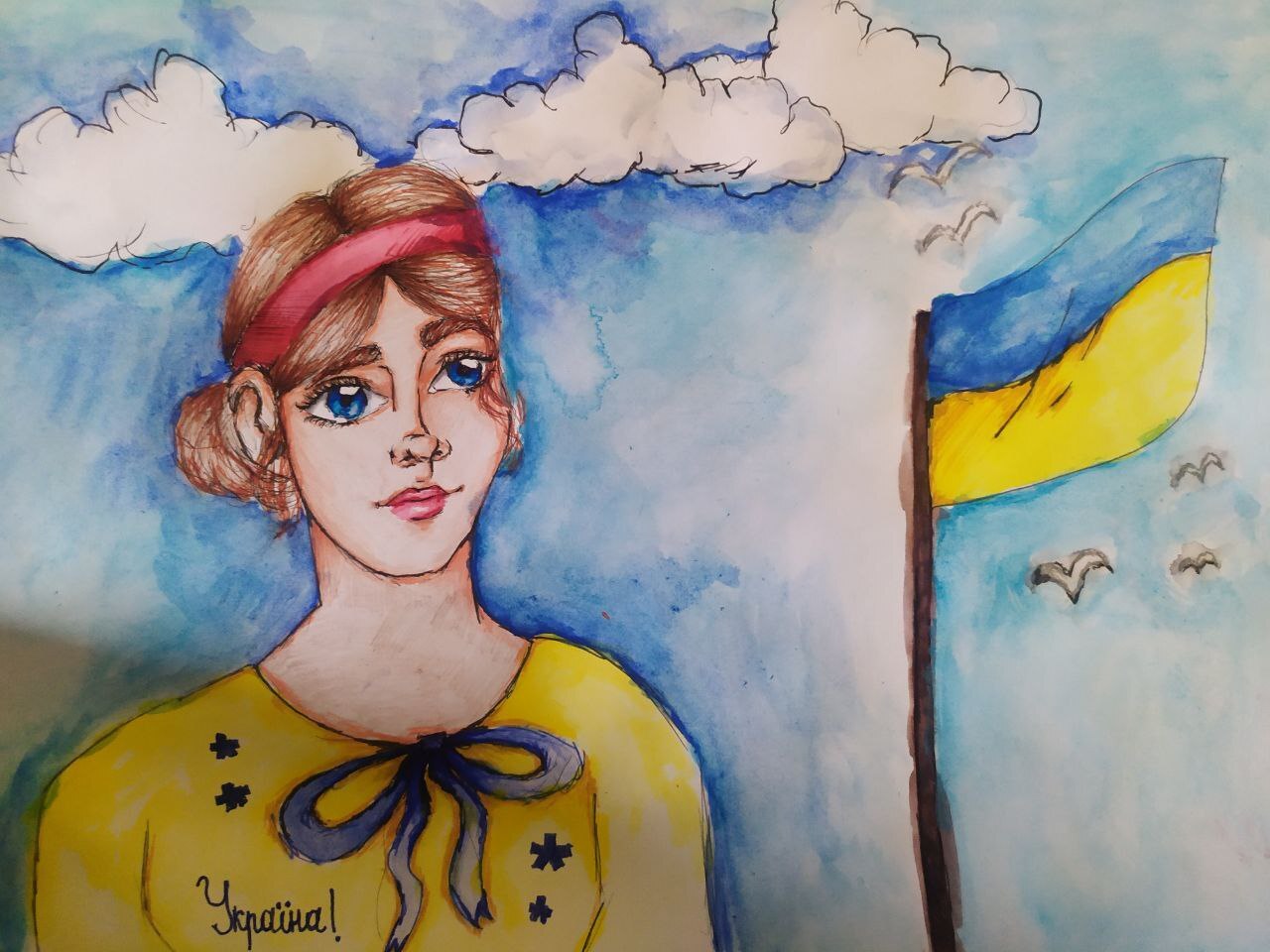
The messages below serve as a window into the experiences of regular Ukrainians during this war and provides concrete examples of how GFC’s partners are able to help on the ground in times of crisis. To date, this partner organization has supported over 120 families in various ways – evacuation, food, medicine, clothes, supplies, cash, emotional support, and more.
The messages in this wartime diary are mostly texts from the partner to GFC with stories of different families, but a few, which are labeled as such, are texts directly from the families to the partner organization. They have been translated from Russian or Ukrainian. All the messages refer to people who have in one way or another received support from GFC through our Emergency Response Fund.
These messages, which came from different corners of Ukraine, represent harrowing wartime experiences of regular Ukrainian people. Every text message was accompanied by a photo, which we are not including in this story in order to protect the identity of the children and their families. Some of the messages also refer to experiences during Russia’s first invasion of Ukraine in 2014, when many families in eastern Ukraine fled to other parts of the country.
March 21, Kyiv (A text message GFC’s partner received): “My dear, sleeping in the basement has caught up with us. Dima has come down with a fever. I decided to stay home today. We turned our bathroom into the children’s room – it’s the safest place. It’s very scary because we live on the ninth floor, but there is nothing else we can do. Our son has a disability, and we already ran away once in 2014.”
March 21, from Sievierodonetsk to Lviv: “Three siblings are on their way to Lviv today. Yesterday morning they were still in Sievierodonetsk. I [the GFC partner] called the governor of the Luhansk region; they helped with the evacuation as much as they could… the shelling continues day and night. The children arrived in Slavyansk, stayed there for a day, they were fed, and now they are on the road to Lviv, to safety. We are now figuring out where to house them in Uzhhorod.”
March 21, Kreminna, Luhansk Region: “One child lives with her family in the area where a nursing home was shot at from a tank; 56 elderly people were killed there. You may have heard… The family is hiding in a basement nearby. Through the GFC grant, we were able to help them with some money and food.”
March 26, Zhytomyr: “A mother with cerebral palsy and a visually impaired daughter survived terrible shelling and are very happy for the help they’re receiving.”
March 26, suburbs of Kyiv: “A brother and sister, 16 and 17 years old, live near Kyiv, and both have impaired vision. They are a huge support to their mom, who is a pediatrician and spends day and night helping children.”
March 26, Kyiv: “Two kids, a brother and a sister, with medical issues; they need medication and continued treatment. Their mother tells us that the money she received from GFC is of amazing help.”
March 26, unknown location: “Another family: the father, a pharmacist, is in a wheelchair, has three small children. They spent three weeks hiding in basements and contracted Covid-19. They were barely able to escape to a safer location just today. We used the GFC grant to help them.”
March 26, Kyiv: “Today two sisters received GFC’s help. They are both diagnosed with autism. Their father is defending Ukraine.”
March 26, Vynohradar neighborhood of Kyiv: “We helped another family. The father is defending Ukraine. They have three young children. We evacuated them from Kyiv from a basement where they were hiding.”
March 26, Zolote, Luhansk Region: “Anechka is an accomplished paralympic athlete. Her mother and sibling are in great need; their house has been destroyed, and they have been under heavy shelling for two weeks. They received help from GFC.”
March 26, Slovyansk: “We helped three sisters today. The eldest has cerebral palsy. The family first suffered in 2014, when they were hiding in the basement from the shelling. The mother was 8 months pregnant at the time. The mother and the girl both fell and got seriously injured. Right now, 8 years later, their situation is just as bad.”
March 27, Volyn Region: “This one family had it pretty quiet. The mom is in a wheelchair, the daughter is 17; they live alone, they have no other family. Until yesterday there were only sirens, but yesterday a missile came… The mother says that they need to leave while they still can, but they live alone in a village that consists mainly of elderly people. There are barely any cars in the village. In order to organize a way out for themselves, they would need to pay, and they have no means. We transferred them some money from the GFC grant to help them get to a train station.”
March 29, Brovary, Kyiv Region: “One family is running away from their home for the second time. The first time was in 2014, when the girls were 7. Both girls are diagnosed with autism. Back in 2014, they were really traumatized – they almost stopped talking. The family has 3 children, and they spent 8 years bringing them back from the ledge – rehabilitation, school, special activities. And there were real results. When the war started on February 24, the kids had to hide in a basement for a week. It was incredibly difficult to get them evacuated. At the time, Kyiv and the region were basically under siege. And now they are constantly afraid, they shudder, they cry… Their father has diabetes and cancer. During war, getting insulin is difficult, and this was yet another challenge for the family because the father is their provider. Thanks to the GFC grant, we are able to help them.”
March 29, Vynohradar neighborhood of Kyiv: “We were evacuating a family – a mother with three kids, the youngest was only 3 weeks. The evacuation happened during one of the most difficult times of the war. There was no transport, constant shelling; it was impossible to leave the basement. Our car couldn’t get to their basement because of the shelling. It’s a good thing that phones and internet work even in times of war. We contacted different groups, posted on various social media. Finally, a man we didn’t know contacted us that he would try to pick them up and bring them to us in Kyiv… to our car, where we already had 7 kids. We paid him 1,000 hryvnia (USD 34). During the 6 days it took us to get them out of Ukraine … we took care of the family – it was the mother with the three kids, and an elderly grandmother. We spent the night near Vinnytsia, we set up overnight stays in Lviv, then in Poland, in Lithuania, and now the family is in Latvia. We took all the costs associated with helping this family onto ourselves, and the GFC grant has been immensely helpful with this – gas, food, diapers, medicine. In the meantime, the father of the family is defending Kyiv.”
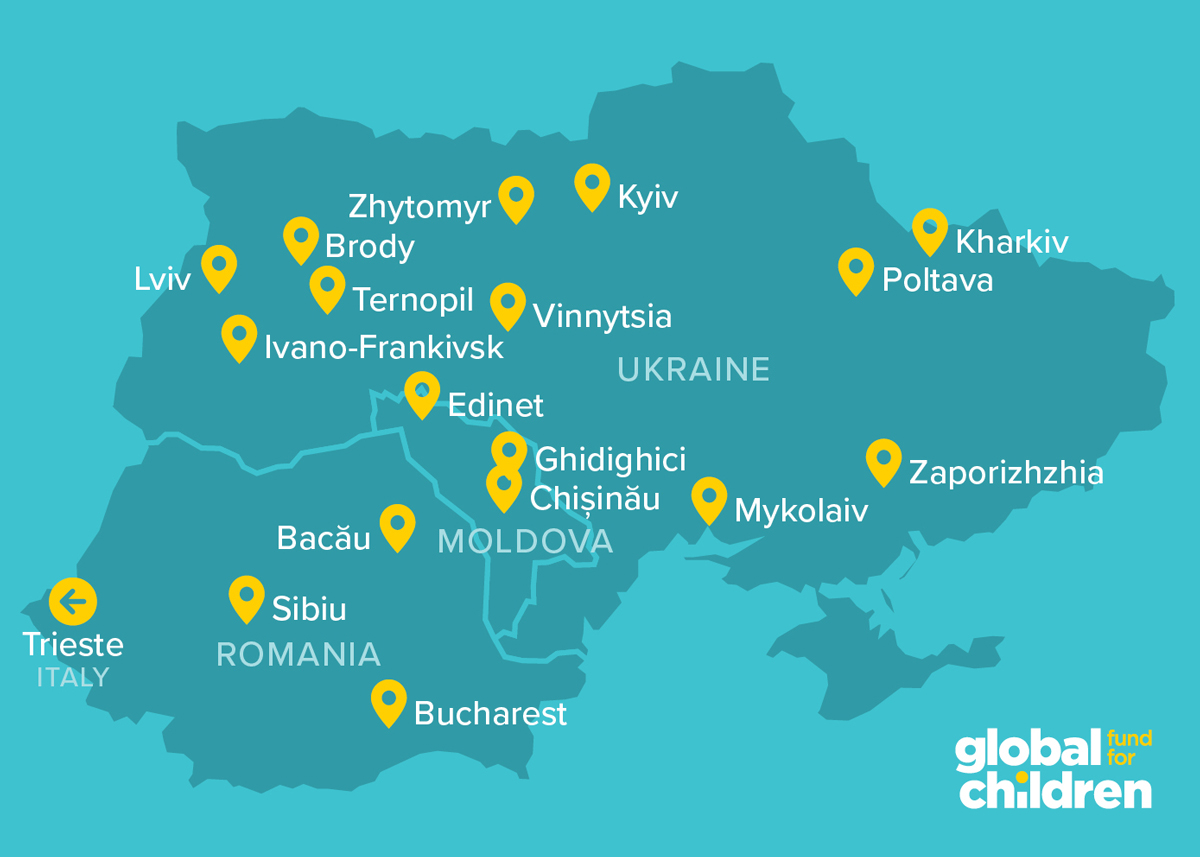
March 29, location unknown (A text message our partner received from a family in hiding): “It is very cold here in the bomb shelter. There is no food, no electricity, no beds, no blankets. Just a basement. We can maybe last a day or two here, I don’t know. We need to get out of here with the children. There is almost no city left. They’ll kill us here. Oh, my god, this is hell, just hell.”
March 31, Rubizhne Village, Luhansk Region: “There are certain cases in particular that leave wounds… A family where both the mother and father have physical disabilities; they have two children, 7 and 13 years old. We helped them set up their life many years ago, when they started a family. We’ve been together all these years. The husband is an amazing programmer. The family had to flee for the first time from Luhansk in 2014. We haven’t been able to reach them since March 9…”
Our partner sent us this message on March 31. She has been trying to get help for this family since early March. She has been sending SOS messages about them to the regional authorities, to emergency services, to the head of the city, to everyone. And everyone has told her over and over that this family’s part of the city is cut off and that no one can get through to that neighborhood. They don’t know whether the family is alive.
March 31, Ivano-Frankivsk Region (A text message our partner received): “I have a severe spinal fracture and get around in a wheelchair. I can’t use my hands and am almost completely paralyzed. We are from Chernihiv, and there are 3 of us – father, mother, and I. Father, who is 73, has stayed behind in the village. Mother is 72. We spent 7 days in a cellar, while our village of Kyinka was being bombed. There is a missile (of the BM-27 Uragan type) lying in our vegetable patch. The windows in the house were blown out immediately. The cellar is cold and damp, with temperatures around 5°C [40°F], there is no electricity or service. All we have is one flashlight. Father would leave the cellar only during the day to check if the house was still standing. Later, mother and I were transferred to a bomb shelter at the church; we lived there on the floor on some mattresses for another 8 days without knowing whether we’d make it till morning… bombs were being dropped usually at night. I got really sick, they’re administering antibiotics intravenously, the cough is suffocating me.”
March 31, Kharkiv: “The father in this family is completely blind; the wife and daughter are also visually impaired. The father is a lawyer, who has been helping get in touch with families who need help, who need to be evacuated. The family refused to leave Kharkiv.”
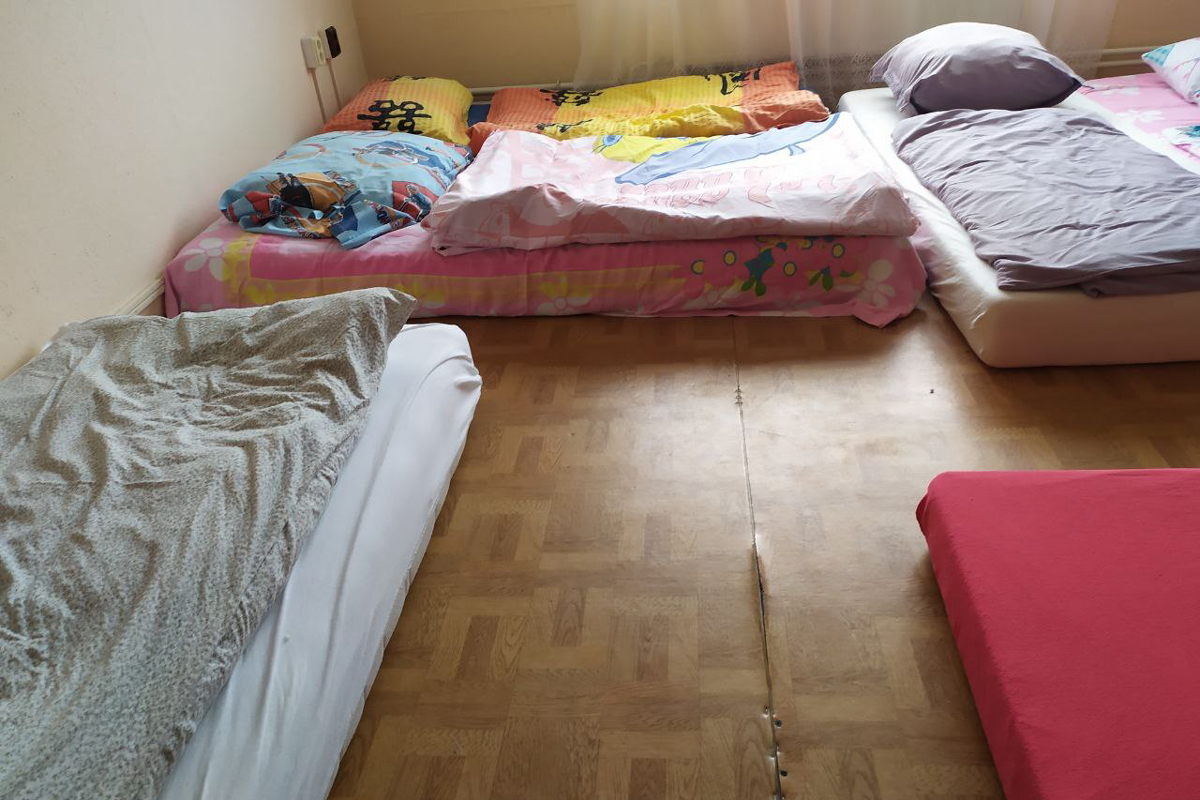
April 2, small village near Sievierodonetsk: “For more than a month, families with children have been hiding in basements and cellars. By March 28, they had practically no service. They would turn their phone on just for a few seconds to send me a text to let me know that they are alive and to send the address of the basement where they were hiding. In order to get them out of the village, we had to be in touch with many different entities helping with evacuation in the region. There is constant fighting going on around there. Very heavy shelling. First, they were taken to the city of Sievierodonetsk to another basement, and the next day they managed to get on a bus. We helped them get to Dnipro, then to Lviv, where they were put up at a center. We gave them money from the GFC grant to top up their phones, bought two sweaters, personal hygiene products, and gave families 1,000 hryvnia for each child.”
The partner also bought a guitar, and in the evening, the partner and the people she evacuated with to a center in Riga, Latvia, get together to read poetry, sing songs, and even sometimes to cry. It’s better than going through it on their own.
Our partner visited a rehabilitation center in Uzhhorod, a city in western Ukraine, that currently doubles as a center for displaced women and children. There are eight of these centers in Ukraine’s westernmost Zakarpattia Region, and she makes note of all the needs they are experiencing. Due to the arrival of so many internally displaced people, these centers are overflowing. With GFC support, her organization is helping the centers with personal hygiene products, rehabilitation and trauma relief services, and other essentials. The centers need even the basics, such as pillows, blankets, and mattresses.
With GFC’s support, our partner is able to bring children with disabilities from all over Ukraine to centers like the one in Uzhhorod and to help some get to safety abroad. Many of these children face serious mobility challenges, and the partner helps them with finding accompaniment for the journey, appropriate transportation, accommodations, and other assistance. She and her colleagues communicate a lot with the parents to understand what the kids’ needs are – food, medicine, hygiene, and anything else.
Most recently, the partner launched an online school for kids, bringing together teachers from all over Ukraine to teach Ukrainian language and literature, voice lessons, art therapy, speech, English, and other subjects. Children from different locations with internet access log in, sometimes even with their families, and use the lessons as a chance to disconnect from the realities of war, displacement, and trauma. Even in times of war, we must give kids a chance to be kids, and a glimmer of hope for something normal. That is what our partner is working so hard to do.
